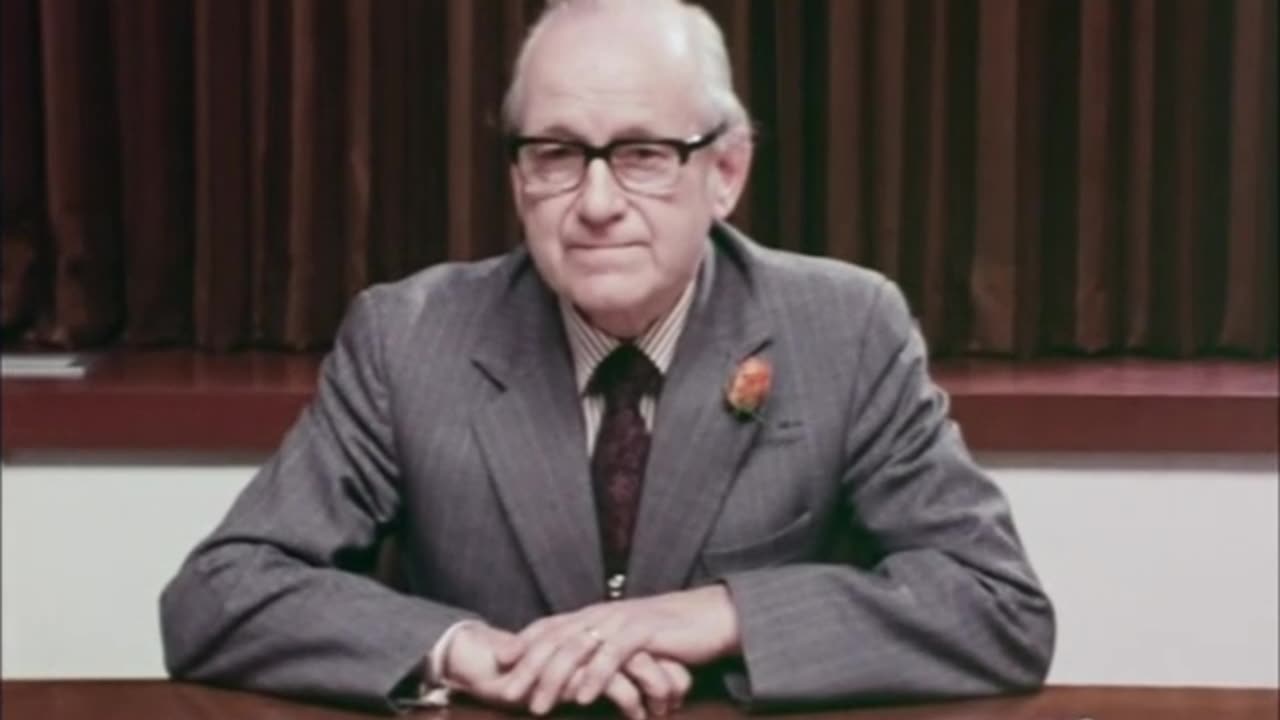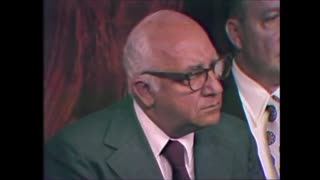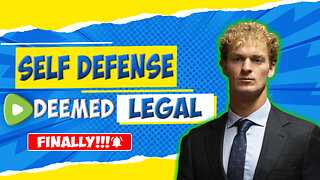Premium Only Content

When the Justice System Fails: No Presumption of Innocence (1974)
This film delves into the harrowing reality of the British prison system, shining a spotlight on the plight of individuals incarcerated without trial or convicted of minor offenses. It uncovers a disturbing truth: a staggering number of individuals, including first-time offenders, minors, and innocent people, find themselves trapped within a system that bears a resemblance to oppressive regimes devoid of fundamental human rights.
The documentary paints a grim picture of the conditions within these prisons, where individuals endure deplorable treatment and confinement. Through firsthand accounts, viewers witness the stark and often inhumane conditions faced by inmates—overcrowded cells, unsanitary facilities, restricted movement, and limited access to essential medications. Stories of individuals forced to share cells with hardened criminals underscore the severe repercussions of the system's failings.
This investigation reveals a startling statistic: a significant portion of those remanded in custody are eventually proven innocent or receive minimal penalties. This revelation prompts a critical examination of the judicial process, with insights from legal professionals highlighting the shortcomings of magistrates who may overlook crucial case details or adopt punitive attitudes without due consideration.
Moreover, the documentary sheds light on the devastating mental toll exacted on prisoners, evident in the alarming rate of attempted suicides within these institutions. The despair and hopelessness experienced by those on remand serve as a poignant reminder of their dire circumstances and the absence of proper guidance and support within a justice system that feels distant and indifferent to their plight.
The documentary is a powerful exposé that challenges the very essence of justice and raises poignant questions about the treatment of individuals ensnared in a system that often fails to uphold their rights and dignity.
A presumption of guilt is any presumption within the criminal justice system that a person is guilty of a crime, for example a presumption that a suspect is guilty unless or until proven to be innocent.[1] Such a presumption may legitimately arise from a rule of law or a procedural rule of the court or other adjudicating body which determines how the facts in the case are to be proved, and may be either rebuttable or irrebuttable. An irrebuttable presumption of fact may not be challenged by the defense, and the presumed fact is taken as having been proved. A rebuttable presumption shifts the burden of proof onto the defense, who must collect and present evidence to prove the suspect's innocence, in order to obtain acquittal.[2]
Rebuttable presumptions of fact, arising during the course of a trial as a result of specific factual situations (for example that the accused has taken flight),[3] are common; an opening presumption of guilt based on the mere fact that the suspect has been charged is considered illegitimate in many countries,[4] and contrary to international human rights standards. In the United States, an irrebuttable presumption of guilt is considered to be unconstitutional. Informal and legally illegitimate presumptions of guilt may also arise from the attitudes or prejudices of those such as judges, lawyers or police officers who administer the system. Such presumptions may result in suspects who are innocent being brought before a court to face criminal charges, with a risk of improperly being found guilty.
Definition
According to Herbert L. Packer, "It would be a mistake to think of the presumption of guilt as the opposite of the presumption of innocence that we are so used to thinking of as the polestar of the criminal process and which... occupies an important position in the Due Process Model."[5] The presumption of guilt prioritizes speed and efficiency over reliability, and prevails when due process is absent.[5]
In State v. Brady (1902) 91 NW 801, Weaver J said "'Presumptions of guilt' and 'prima facie' cases of guilt in the trial of a party charged with crime mean no more than that from the proof of certain facts the jury will be warranted in convicting the accused of the offense with which he is charged".[6]
Human rights
In Director of Public Prosecutions v. Labavarde and Anor, Neerunjun C.J. said that article 11(1) of the Universal Declaration of Human Rights and article 6(2) of the Convention for the Protection of Human Rights and Fundamental Freedoms would be infringed if "the whole burden is ... cast on the defence by the creation of a presumption of guilt on the mere preferment of the criminal charge".[7][8]
Inquisitorial systems
It is sometimes said that in inquisitorial systems, a defendant is guilty until proven innocent.[9] It has also been said that this is a myth,[10] as well as a former "common conceit of English lawyers" who asserted this was the case in France.[11][12]
A presumption of guilt is incompatible with the presumption of innocence and moves an accusational system of justice toward the inquisitional.[13]
Common law presumptions
There have existed at least two types of presumption of guilt under the law of England, which arose from a rule of law or a procedural rule of the court or other adjudicating body and determined how the facts in the case were to be proven, and could be either rebuttable or irrebuttable. Those were:[14]
Presumption of guilt arising from the conduct of the party charged
Presumption of guilt arising from the possession of provable stolen property
Consequences
Plea bargaining has been said to involve a presumption of guilt.[15] The American Bar Association states that people with limited resources accused of a crime "find themselves trapped by a system that presumes their guilt."[16] Presumption of guilt on the part of investigators may result in false confessions,[17] as was postulated in Making a Murderer, an American documentary television series.[18]
Preventive detention, detaining an individual for a crime they may commit, has been said to involve a presumption of guilt, or something very close to one.[19][20]
A fixed penalty notice or on-the-spot fine are penalties issued by police for minor offences which are difficult and expensive to appeal.[21]
Unconstitutional, illegitimate and informal presumptions
An irrebuttable presumption of guilt is unconstitutional in the United States.[22] An arrest, however, often becomes synonymous or "fused" with guilt, postulates Anna Roberts, a United States law professor.[23] In the minds of jurors, the person charged must have done something wrong.[18]
In Japan the criminal justice system has been criticized for its wide use of detentions during which suspects are forced to make false confessions during interrogations.[24][25] In 2020, Japan's Justice Minister Masako Mori tweeted regarding the need for someone to prove their innocence in a court of law. She later deleted the tweet and called it "verbal gaffe".[26]
High Court judge Sir Richard Henriques has criticized UK police training and methods which allegedly assert that "only 0.1% of rape allegations are false", and in which all complainants are treated as "victims" from the start.[27][28] It is difficult to assess the true prevalence of false rape allegations, but it is generally agreed that rape accusations are false at least 2% to 10% of the time, with a greater proportion of cases not being proven to be true or false.[29][30]
The American actor and producer Jeremy Piven has spoken out against the Me Too movement, which he claims, "put lives in jeopardy without a hearing, due process or evidence". Writing about Piven's comment, journalist Brendan O'Neill, suggests that the presumption of innocence is being weakened.[31]
An illegitimate presumption of guilt may be caused or motivated by factors such as racial prejudice,[32] "media frenzy",[18][33] cognitive bias,[18][32][34] and others.
See also
Blackstone's ratio
False accusation
Give me the man and I will give you the case against him
Kangaroo court
Prosecutor's fallacy
Understanding
References
Raj Bhala. Modern GATT Law: A Treatise on the General Agreement on Tariffs and Trade. Sweet & Maxwell. 2005. Page 935.
Roscoe, H.; Granger, T.C.; Sharswood, G. (1852). A Digest of the Law of Evidence in Criminal Cases. T. & J.W. Johnson. Retrieved 11 March 2020.
This is how presumptions have traditionally been classified: Zuckerman, The Principles of Criminal Evidence, 1989, pp 112 to 115. An irrebuttable presumption of guilt is unconstitutional in the United States: Florida Businessmen for Free Enterprise v. State of Fla. See United States Code Annotated. An example of a rebuttable presumption of guilt is (1983) 301 SE 2d 984. "The presumption of guilt arising from the flight of the accused is a presumption of fact": Hickory v United States (1896) 160 United States Reports 408 (headnote published 1899).
Ralph A Newman (ed). Equity in the World's Legal Systems. Établissements Émile Bruylant. 1973. p 559.
Packer, Herbert L. (November 1964). "Two Models of the Criminal Process". University of Pennsylvania Law Review. Pennsylvania: University of Pennsylvania. 113 (1): 1–68. doi:10.2307/3310562. JSTOR 3310562. Archived from the original on 27 April 2019. Retrieved 7 May 2019.
Wigmore, John Henry (1905). A Treatise on the System of Evidence in Trials at Common Law. Vol. 4. Boston: Little, Brown and Company. p. 3562, Note 1 to section 2513 – via Internet Archive.
Director of Public Prosecutions v. Labavarde and Anor. (1965) 44 International Law Reports 104 at 106; Mauritius Reports, 1965 72 at 74, Mauritius, High Court
Lauterpacht, E. (1972). International Law Reports. International Law Reports 160 Volume Hardback Set. Cambridge University Press. p. 104. ISBN 978-0-521-46389-8. Retrieved 11 March 2020.
For example, Scottish International, vols 6 to 7, p 146
Dammer and Albanese. Comparative Criminal Justice Systems. Wadsworth. 2014. p 128.
Roberts and Redmayne. Innovations in Evidence and Proof: Integrating Theory, Research and Teaching. Hart Publishing. Oxford and Portland, Oregon. 2007. p 379.
For the origins of this belief in South Africa, see (1970) 87 South African Law Journal 413
Ingraham, Barton L. (1996). "The Right of Silence, the Presumption of Innocence, the Burden of Proof, and a Modest Proposal". Journal of Criminal Law & Criminology. 86 (2): 559. doi:10.2307/1144036. JSTOR 1144036. Retrieved 31 August 2021.
Roscoe, H.; Granger, T.C. (1840). A Digest of the Law of Evidence in Criminal Cases. p. 13. Retrieved 11 March 2020.
"5. The Presumption of Guilt" (1973) 82 Yale Law Journal 312; "The Skeleton of Plea Bargaing" (1992) 142 New Law Journal 1373; (1995) 14 UCLA Pacific Basin Law Journal 129 & 130; (1986) 77 Journal of Criminal Law & Criminology 950; Stumpf, American Judicial Politics, Prentice Hall, 1998, pp 305 & 328; Rhodes, Plea Bargaining: Who Gains? Who Loses?, Institute for Law and Social Research, 1978, p 9.
Lewis, John; Stevenson, Bryan (1 January 2014). "On the Presumption of Guilt". American Bar.
Green and Heilbrun, Wrightsman's Psychology and the Legal System, 8th Ed, Wadsworth, 2014, p 169; Roesch and Zapf and Hart, Forensic Psychology and Law, Wiley, 2010, p 158, Kocsis (ed), Applied Criminal Psychology, Charles C Thomas, 2009, p 200; Michael Marshall, "Police Presumption of Guilt Key in False Confessions". 12 November 2002. University of Virginia School of Law.
Findley, Keith (19 January 2016). "Opinion | The presumption of innocence exists in theory, not reality". Washington Post. Archived from the original on 18 August 2019. Retrieved 11 March 2020.
"Preventive Detention: Prevention of Human Rights" (1991) 2 Yale Journal of Law and Liberation 29 at 31; Selected Decisions of the Human Rights Committee under the Optional Protocol, United Nations, 2007, vol 8, p 347
New York Review, 'How internment became legal' Archived 8 October 2019 at the Wayback Machine, John Townsend Rich, 22/6/2017
Goodman, Emily Jane (7 October 2010). "With Parking Tickets, New Yorkers Are Guilty Until Proven Innocent". Gotham Gazette. Archived from the original on 21 November 2017. Retrieved 11 March 2020.
Florida Businessmen for Free Enterprise v. State of Fla (1980) 499 F.Supp. 346. See United States Code Annotated.
Roberts, Anna (23 April 2018). "Arrests As Guilt". SSRN 3167521.
Hirano, Keiji (13 October 2005). "Justice system flawed by presumed guilt". Japan Times Online. Archived from the original on 21 December 2014. Retrieved 10 March 2020.
Kingston, Jeff (8 January 2020). "The Carlos Ghosn case shines a light into the dark corners of Japanese justice". The Guardian. Archived from the original on 29 February 2020. Retrieved 10 March 2020.
Adelstein, Jake; Salmon, Andrew (13 January 2020). "'Guilty until proven guilty' in Japan and Korea". Asia Times. Archived from the original on 5 March 2020. Retrieved 10 March 2020. ""If he's clean as he says he is, then he should fairly and squarely prove his innocence in the court of law.""
Marco Giannangeli, "Police must stop training 'Presumption of Guilt', says High Court judge" Archived 7 February 2018 at the Wayback Machine, Daily Express, 24 December 2017. Accessed 6 February 2018.
"Former High Court judge warns calling complainants 'victims' creates presumption of guilt", Scottish Legal News, 6 August 2019
DiCanio, M. The encyclopedia of violence: origins, attitudes, consequences. New York: Facts on File, 1993. ISBN 978-0-8160-2332-5.
Lisak, David; Gardinier, Lori; Nicksa, Sarah C.; Cote, Ashley M. (2010). "False Allegations of Sexual Assault: An Analysis of Ten Years of Reported Cases". Violence Against Women. 16 (12): 1318–1334. doi:10.1177/1077801210387747. PMID 21164210. S2CID 15377916. Archived from the original on 15 March 2017. Retrieved 7 February 2018.
Brendan O'Neill, "Whatever Happened to the Presumption of Innocence?" Archived 7 February 2018 at the Wayback Machine, Los Angeles Times, 16 November 2017. Accessed 6 February 2018.
Stevenson, Bryan (24 June 2017). "A Presumption of Guilt". The New York Review of Books. Archived from the original on 12 December 2019. Retrieved 5 March 2020.
"SHEPPARD v. MAXWELL (1966), No. 490, Argued: February 28, 1966 Decided: June 6, 1966". FindLaw's United States Supreme Court. Archived from the original on 6 December 2019. Retrieved 30 November 2019.
"Cognitive Bias and Its Impact on Expert Witnesses and the Court". Archived from the original on 23 December 2019. Retrieved 23 December 2019.
Further reading
"Prima Facie Presumptions of Guilt" (1972) 121 University of Pennsylvania Law Review 531
Fellman. "Statutory Presumptions of Guilt". The Defendant's Rights Today. University of Wisconsin Press. 1977. p 106.
Martin, "The Burden of Proof as Affected by Statutory Presumptions of Guilt" (1939) 17 Canadian Bar Review 37
Roscoe, H.; Granger, T.C. (1840). A Digest of the Law of Evidence in Criminal Cases.
Wharton. A Treatise on the Criminal Law of the United States. 1857. Sections 714, 727, 728
Presumption of Guilt: The Global Overuse of Pretrial Detention published by Open Society Foundations
-
 3:01:13
3:01:13
The Memory Hole
1 month agoWatergate Hearings Day 43: John R. "Fat Jack" Buckley (1973-10-09)
701 -
 6:29
6:29
BIG NEM
19 hours agoCultivating God Mode: Ancient Taoist NoFap Practices
17.4K6 -
 30:53
30:53
Uncommon Sense In Current Times
1 day ago $2.93 earned"Pardon or Peril? How Biden’s Clemency Actions Could Backfire"
26.9K2 -
 40:01
40:01
CarlCrusher
17 hours agoSkinwalker Encounters in the Haunted Canyons of Magic Mesa - ep 4
31.1K2 -
 59:44
59:44
PMG
1 day ago $3.32 earned"BETRAYAL - Johnson's New Spending Bill EXPANDS COVID Plandemic Powers"
43.9K14 -
 6:48:50
6:48:50
Akademiks
16 hours agoKendrick Lamar and SZA disses Drake and BIG AK? HOLD UP! Diddy, Durk, JayZ update. Travis Hunter RUN
166K28 -
 11:45:14
11:45:14
Right Side Broadcasting Network
9 days agoLIVE REPLAY: TPUSA's America Fest Conference: Day Three - 12/21/24
350K28 -
 12:19
12:19
Tundra Tactical
16 hours ago $12.92 earnedDaniel Penny Beats Charges in NYC Subway Killing
69K13 -
 29:53
29:53
MYLUNCHBREAK CHANNEL PAGE
1 day agoUnder The Necropolis - Pt 1
158K52 -
 2:00:10
2:00:10
Bare Knuckle Fighting Championship
3 days agoCountdown to BKFC on DAZN HOLLYWOOD & FREE LIVE FIGHTS!
59.7K3